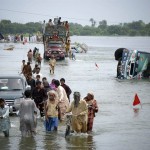DETERRENCE: A Time-Lapse Map of Every Nuclear Explosion Since 1945 DPRK: The Korean War and Sino-North Korean Friendship ENERGY SECURITY: Timing a rise in sea level GOVERNANCE AND CIVIL SOCIETY: Ban lifted, Japan’s politicians race online CLIMATE CHANGE ADAPTATION: Costs and Coasts: An Empirical Assessment of Physical and Institutional Climate Adaptation Pathways CLIMATE CHANGE AND SECURITY: Icelandic academics warn independent Scotland would […]
Archives
Thoughts on China’s National Interests

[IN CHINESE] Zhang Tuosheng discusses China’s national interests, especially China’s core interests as articul…
Strategic Environment for Kim Jong-Un’s Visit to China: Three Emphases

Roger Cavazos: Any visit Kim Jong-un will make to China will have a broader bi-lateral component and a lesser …
Nautilus Peace and Security Weekly – 8 August 2013
AUSTRAL PEACE AND SECURITY: Peace hopes rise for West Papua DETERRENCE: Pentagon Conducts Overhaul of War Plans DPRK: Asian leaders discuss unease over North Korea ENERGY SECURITY: Europe Must Tackle Air Pollution, Warn UN Scientists GOVERNANCE AND CIVIL SOCIETY: Video game pits China against Japan over island dispute CLIMATE CHANGE ADAPTATION: Climate change adaptation and the rental sector AUSTRAL PEACE AND SECURITY: Peace […]
“The Papua-New Guinea Solution”: Competitive Cruelty and Strategic Folly

Richard Tanter writes that policy competition between the Labor government and conservative opposition to “stop the boats” bringing asylum seekers to Australia by ship is producing strategically dangerous outcomes. Both government and opposition are now committed to isolating all asylum seekers arriving in Australia by boat in Papua-New Guinea, in cluding successful applicants for asylum. It is hard, Tanter concludes, “to think of anything else an Australian government could do in a single policy move more likely to undermine the already limited chances of sustainable peace in Papua-New Guinea.”
Richard Tanter is a Nautilus Institute Associate and Professor in the School of Political and Social Studies at the University of Melbourne.
Local Level Responsibility for Climate Change in Pakistan

Saleem Janjua writes that “increasing the capability to adapt at the local government level in Pakistan will definitely lessen susceptibility to the effects of climate change at provincial and federal levels. Hence, in Pakistan, we must begin planning our adaptive reactions now at grass-root level to help lessen some of the environmental, economic and social impacts of climate change.”
Saleem Janjua is the Climate Change Adpation contributor to the NAPSNet Weekly Report, and the Editor of AdaptNet.
Nautilus Peace and Security Weekly – 1 August 2013
- DETERRENCE: Why the smart grid might be a dumb idea
- DPRK: (North) Korea commemorates the 60th anniversary of the armistice with a military parade attended by Li Yuanchao
- ENERGY SECURITY: “Zombie” CO2 projects on the rise as CDM hits 7,000
- GOVERNANCE AND CIVIL SOCIETY: Street protests outdated political tool
- CLIMATE CHANGE ADAPTATION: Adaptation or development? Exploring the distinctions (or lack thereof) through case studies in Bangladesh and Vietnam
- CLIMATE CHANGE AND SECURITY: Missing the poorest for the trees? REDD+ and the links between forestry, resilience and peacebuilding
Challenges, Opportunities and Strategies

This is the second in a three part series of articles from Professor Zhang Tuosheng of the China Foundation fo…
Deep Borehole Disposal of Spent Fuel and Other Radioactive Wastes
This report by Neil Chapman “provides a review of the status of international research and policy on the use of very deep boreholes (several kilometres in depth) for the disposal of radioactive wastes.” While reviewing numerous studies on deep borehole disposal of spent fuel, HLW and other radioactive wastes, Chapman finds that “a key gap continues to be a comprehensive operational and post-closure safety assessment of DBD.” He also finds that “the lack of full-scale trials of certain aspects of the technology (not necessarily at envisaged disposal depths) is holding up further development.”
Professor Neil Chapman is a senior scientist with 35 years’ experience in the scientific and strategic aspects of deep and shallow disposal of radioactive wastes, including provision of advice at the highest level to industrial and governmental organisations.
Nautilus Peace and Security Weekly – 25 July 2013
- DETERRENCE: @tomic 2012: an exercise in perspective
- DPRK: Zone of engagement: can North Korea’s Kaesong complex be internationalized?
- ENERGY SECURITY: Parliament takes first step to fix carbon market
- GOVERNANCE AND CIVIL SOCIETY: Japan’s PM Abe’s mandate is much smaller than it looks
- CLIMATE CHANGE ADAPTATION: The climate adaptation frontier
- AUSTRAL PEACE AND SECURITY: Pine Gap drives US drone kills

